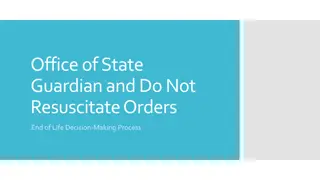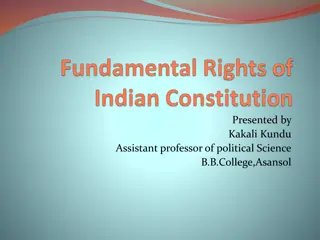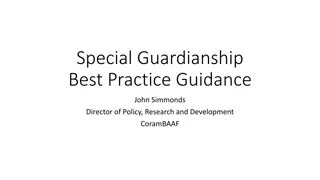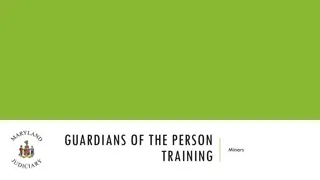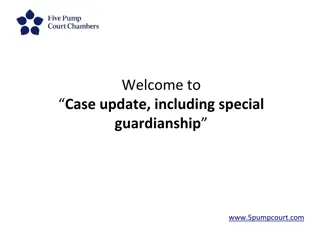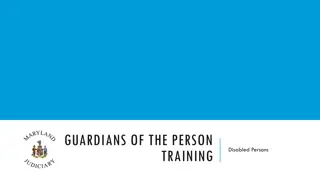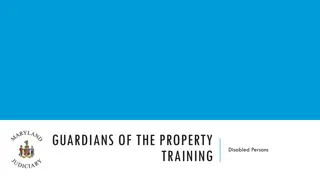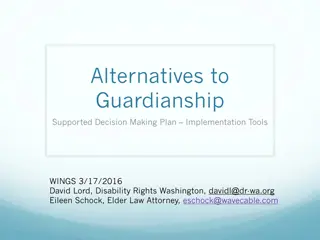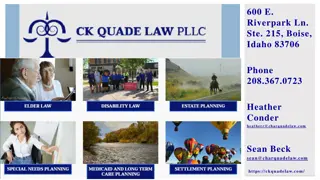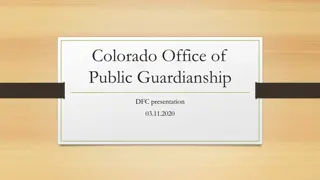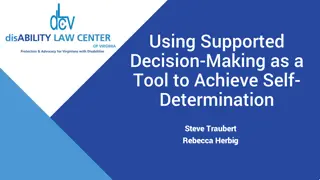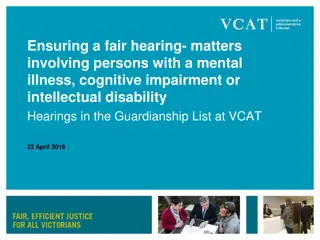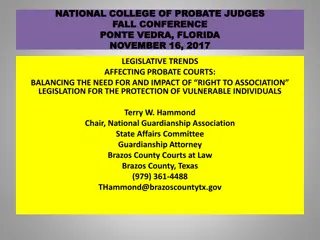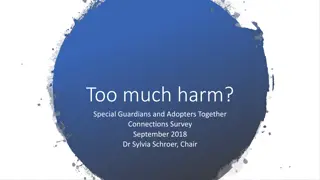Understanding Guardianship and Individual Rights
Guardianship involves legal issues related to decision-making for incapacitated individuals. It is not always appropriate for certain challenges and should prioritize the individual's rights and dignity of risk. Individuals subject to guardianship retain certain rights, including seeking modifications and having grievances addressed in court. It is essential to understand the nuances of guardianship to ensure individuals' self-determination and best interests are upheld.
Download Presentation

Please find below an Image/Link to download the presentation.
The content on the website is provided AS IS for your information and personal use only. It may not be sold, licensed, or shared on other websites without obtaining consent from the author. Download presentation by click this link. If you encounter any issues during the download, it is possible that the publisher has removed the file from their server.
E N D
Presentation Transcript
Guardianship KAREN KOCH RON BASSMAN
Mr. Italiano remains an incapacitated person and legally unable to provide consent of any kind to any person or entity. All consents and Releases including HIPAA, are to be signed by a representative of this Agency. We will gladly sign release for Embassy with the ownership change as well as all subcontractors and providers who serve Mr. Italiano with the exception of one entity. Fax from the Area Agency on Aging We prohibit contact of any kind by Center for Independent Living/Roads to Freedom, including verbal, electronic, written, direct and indirect. This includes attempts by this entity to reach Mr. Italiano through secondary sources. Our Agency is transferring all services that were pending or provided by this entity. Feel free to refer them to Mr. Ray Ghaner, Esq. if they have any questions about this decision.
Guardianship Not Appropriate for Issues It Is Unlikely to Fix Elopement Challenging behaviors such as property destruction, aggression, criminal activity Choice of social relationships Failure of person to take medication or engage in services such as counseling.
Not intended simply for people who make bad or even unsafe decisions. Not necessary for parents/supporters to stay involved in decisions and services if person wants them to remain involved. Misconceptions About Guardianship Not the same power and control parents/guardians of minors have. Adults that need supports, even those in need of full-time supports, is not itself a basis for guardianship Guardianship is not easy to terminate, even when intended to be temporary at the outset.
Dignity of Risk Dignity of risk refers to the legal right of every person, including those with a disability, to make choices and take risks in order to learn, grow and have better quality of life. Bad Decision If that choice doesn t put them, or others, at risk of serious injury, they should be allowed to make that choice. Dangerous Decision
Rights Retained by Individuals Subject to Guardianship Right to seek modification/termination in court and right to attorney Right to Grievance in court If order is for limited guardianship, any right not expressly given to guardian Guardians must promote self-determination Guardians must make decision they believe the adult would make absent a guardian if it would not unreasonably harm, and only if not, then best interests.
Rights Retained (cont.) Right to marry unless otherwise ordered Right to vote unless otherwise ordered Dwelling-Guardian must chose least restrictive dwelling; must notify court of moves and whether adult objected; Can t move to place where restrictions on leaving or having visitors absent court order and notice of right to object. Guardian can t surrender person s lease without court order and notice of right to object.
Which Types of Decisions Need Support? There are many areas of life where a person may need help making decisions! Some examples are: Finances Healthcare Education Work Life Plans
Less Restrictive Alternatives Supportive Decision Making Advance Health Care Directives Powers of Attorney Representative Payees
Supported Decision Making Supported Decision-Making (SDM) is a series of relationship, practices, arrangements, and agreements of more or less formality and intensity designed to assist an individual with a disability to make and communicate to others decisions about the individual s life. -Robert Dinerstein SDM can take many forms. Completely informal (so often invisible). Formalized through a facilitated process that may involve a written agreement/contract Creates a community of supporters and identifies accommodations for decision-making. Creating tools to empower people to say no, get help, etc.
Key Differences between SDM and Guardianship: Supported Decision-Making Guardianship Presumes Capacity Restrictive by design-an individual s powers, rights, and authority are transferred to a surrogate. Least restrictive alternative Allows for truly individuals supports and accommodations to aid in decision making Considered only after less-restrictive alternatives are explored. Acknowledges other practical and legal options that can address challenges
Outlines a persons wishes in the event that he or she is incapacitated or unable to express wishes for health care and treatments. Under federal law, any facility receiving Medicare or Medicaid reimbursements is required to use advance directives. Individuals with a physical and behavioral health illness are covered under this mandate. What is an Advance Directive?
People are able to express their preferences on where to receive care and what treatments they are willing to undergo. They are also able to identify an agent or representative who is trusted and legally empowered to make healthcare decisions on their behalf. These decisions may include the use of all or certain medications, preferred facilities, and listings of visitors allowed in facility-based care. Advance directive laws may vary across states. Therefore, it is important to be sure that any advance directive form meets the requirements of a given state. Behavioral Health Advance Directive
MindFreedom International Flowchart for Shield: Step 1 1. A complaint comes to the attention of MindFreedom International (MFI) or one of our Affiliates -- generally with a phone call or email to our MFI office in Eugene, Oregon.
MindFreedom International Flowchart for Shield: Step 2 2. a. As quickly as possible, the complainant is contacted and given the opportunity to explain their situation and what the person wants to accomplish and what help they are seeking. We ll always strive to follow all core disability rights principles. b. The complainant is informed about Shield by MFI staff and told what might be the best course to pursue. Typically, several rounds of interviews with the complainant are needed to get the necessary details. MFI strives to be as prompt as possible in this process. c. Always the complainant is in charge of what information is permitted to be disclosed and what help is desired. Any questions about privacy are discussed. d. When a complaint comes through an MFI Affiliate, MFI staff are available to coordinate, consult and provide support. Shield requests and complaints are reported to the MFI Shield Committee where actions to be taken are discussed. Depending on the needs of the complainant, consideration is given to referring them for local support, i.e. an advocate, legal counsel, or an organization that works to support an individual's rights. At this point, the complainant may choose to simply issue their own personal alert.
Mind Freedom International Flowchart for Shield: Step 3 3. A full MFI Shield Alert is initiated when it is necessary to exert maximum public pressure for the mental health authority (e.g. psychiatrist or administrator) to reconsider the unwanted treatment (e.g. forced electroshock). A narrative of the situation, directed by the complainant and with the assistance of MFI staff, for the full Shield Alert. Special efforts will be made to include direct quote(s) from the complainant. Ideally, one decision-maker is chosen per alert. The narrative along with a list of names, addresses, emails and phone numbers are sent out to Shield members with a sample skeleton letter of what might be written or points to discuss in a phone call. Local media (such as, if appropriate, newspapers) are contacted to advise them of the circumstances. Op-ed pieces and letters to the editor are encouraged. When needed, government elected officials and employees may be contacted. MFI's relationships with advocates throughout the states and other countries are extremely useful in learning where it is most helpful to provide pressure during any response to a Shield request. Taking violations out of the dark and exposing these acts to the light, and most importantly letting the powers that be know that this person is not alone but has support is effective. MFI will keep adding supporters to Shield Alert List.
CIL Staff Role to Assist a Consumer with a Guardian (In Pennsylvania) 1. Intake Contact-Listen carefully for barriers created due to having a guardian. 2. If the consumer is seeking assistance to reverse or combat guardianship, there is initial information that you will need to gather. 3. Assure the person understands their rights! Educate, Educate, Educate! 4. What county did the guardianship originate in? 5. Which Judge ruled on the competency status? 6. What person/entity initially petitioned the court for guardianship? 7. Who is the guardian? Is the guardian an individual or an agency that provides this service? 8. 9. Does the person have access to the guardianship document? Why was guardianship pursued? Offer referrals to agencies that may be able to assist with this. (See the list of resources shared at the end of this presentation.) 10. Is the person enrolled in Community Health Choices or other Home and Community Based (HCBS) services? Is the guardian impacting the individual s ability to live in the community? Have the choices made by the guardian created a negative impact on the person s health? 11. Develop a barrier removal plan with the consumer.
Click On the Links to Visit Resources National Organizations State Level Resources National Disability Rights Network Disability Rights of PA ADA Networks ADAPT Pennsylvania Statewide Independent Living Council CEAR MindFreedom International (MFI) - Win human rights in mental health! Association of Programs for Rural Independent Living (APRIL) National Council on Independent Living
Click on the Links to Visit Resources Continued Governmental Representatives Government and Justice Contacts National Site to ID Your State Representatives ACL Dept. of Justice Reach a Senator in DC Overall Resources Rethinking Guardianship To Protect Disabled People s Reproductive Rights - Center for American Progress
Contact Karen Koch Ron Bassman kkoch@cilncp.org ron@ronaldbassman.com 570-327-9070 Ext: 239


